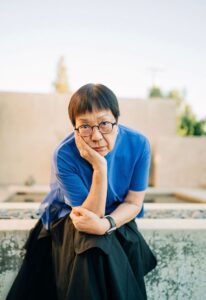 No one else is able to depict the nuances of a human life like Ann Hui through the lens of her work. For forty years in the film industry, she has been bringing up important issues of (not only) Hong Kong society. And we are incredibly honoured to dedicate the 19th Filmasia to this incredible film maker. Thanks to four film screenings and a Master Class, Czech audience will be able to experience how unique and brilliant she is.
No one else is able to depict the nuances of a human life like Ann Hui through the lens of her work. For forty years in the film industry, she has been bringing up important issues of (not only) Hong Kong society. And we are incredibly honoured to dedicate the 19th Filmasia to this incredible film maker. Thanks to four film screenings and a Master Class, Czech audience will be able to experience how unique and brilliant she is.
Ann Hui has always been fascinated by social themes. Her first experience in the industry was in the 1970s when she started working for Television Broadcast Limited (TVB) and later for Radio Television Hong Kong (RTHK) where she collaborated on several docudramas with social aspects. When she finally released her first feature film, The Secret (1979), it already foreshadowed some of the key motifs of her future film production. The Secret is a crime thriller with a complex narrative based on a real-life murder case that revolves around a strong female character. The apparent connection with actual events and the empathetic portrayal of the heroine served as the driving force of the criminal investigation as well as for Hui’s other films.
Ann Hui has never feared genre films, but since the 1980s she has built a reputation of an author focusing mainly on different forms of aesthetic realism. In films like Story of Woo Viet (1981) and Boat People (1982), she explores the landscape of postwar Vietnam and migration crisis and enjoyed success at the Cannes Film Festival. Both films reflected similar problems of Hong Kong at the time. In My American Grandson (1990) she introduces the issue of diasporas and inter-generational and cultural barriers, the brilliant Summer Snow (1995) takes a bittersweet look at caring for a widower with Alzheimer’s disease and The Stunt Woman (1996) gets inside the difficult position of a stunt woman in the Hong Kong film industry. Each of her films focuses on a specific social problem that often reaches far beyond Hong Kong.
While the work of directors such as Tsui Hark, John Woo or Patrick Tam was characteristic with the emphasis on stylistic opulence, Hui’s films have always been more subtle. Even when she narrates a story with complexity and deliberation – such as the narrative puzzle, The Secret (1979) – scenes are dominated by people gazing, the absence of words or long shots letting the audience connect with characters. In historical blockbuster Our Time Will Come (2017), the main female protagonist unexpectedly stops in the middle of a road and the director gives us a minute to feel her state of mind. In peace and quiet, without opulent stylistic technique. She attracts the audience with creative precision and then captures their hearts by the nuanced way of showing emotions. We find less spectacular camera movements, fewer rapid montages or canted angle shots in her films than in those of her New Wave colleagues. As if the theme should be given priority over style. At the same time, her reputation has reached and impressed Hollywood, she can be full of surprises and make unexpected creative moves. Ann Hui’s style is deeply personal and unique. No one makes films the way she does.
Since the 1970s, Ann Hui has made an unforgettable mark in the history of world cinema and to this day remains one of the most influential woman directors in the world. Her work has never lost that critical edge which has made her so provocative. And this year she will be able to capture the viewers’ attention in Prague.
